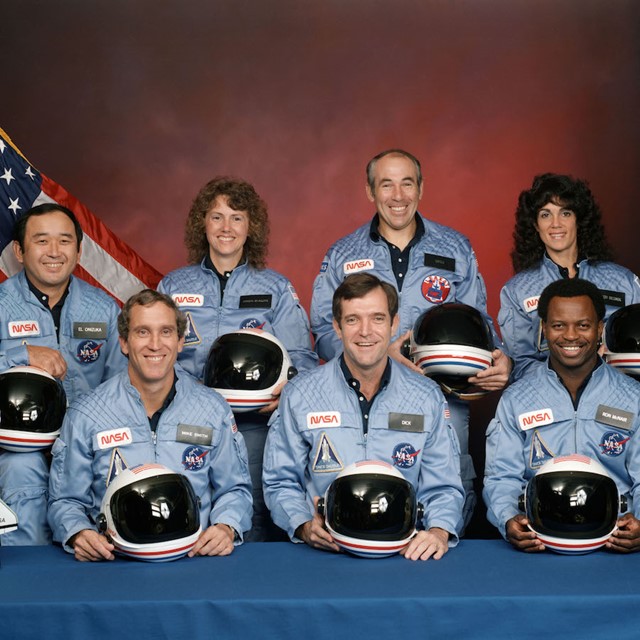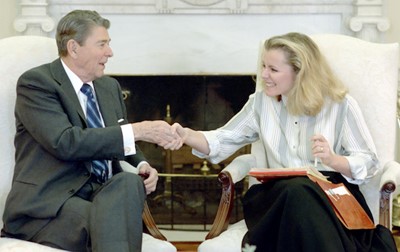
The crew of the Space Shuttle Challenger.
"We will never forget them, nor the last time we saw them, this morning, as they prepared for their journey and waved goodbye and 'slipped the surly bonds of earth' to 'touch the face of God.'"
– Reagan's Challenger Disaster speech
He was supposed to give the State of the Union address. But President Ronald Reagan postponed it, for the first time in modern history. Because on January 28, 1986, the Space Shuttle Challenger broke apart during launch, killing the seven people on board, as the world watched on television.
Reagan delivered a message five hours later to address the disaster, a speech even his toughest critics have praised for both its words and delivery.
The message was written by Peggy Noonan, who at the time was a little known White House speechwriter. Or as she has described her status then: "a little schmagoogie in an office in the Old Executive Office Building."
 President Ronald Reagan with Peggy Noonan in 1988.
President Ronald Reagan with Peggy Noonan in 1988.
The little schmagoogie wrote a speech that has lessons for us today:
- Simple language is powerful--Noonan uses plain words and short sentences. The simple language keeps the attention on the subject of the speech, rather than drawing attention to the speaker.
- Consider what the audience needs and what you need for them to take away--The speech needed to send messages to many audiences, ranging from school children to those in the Soviet Union who might find fault with the U.S. space mission. As Noonan herself said, "The president is going to have to do a speech that is aimed at those who are 8-years-old, and those who are 18, and those who are 80 without patronizing anybody."
- There's a benefit to not over-thinking. Noonan said she thought one advantage of writing so quickly was that the speech didn't go through the usual rounds of staff revisions. She also says that the closing lines came to her in the rush of writing; it was a poem she recalled from seventh grade.
Reagan, often called "the great communicator," was not so sure about those closing lines it turns out. He, too, was familiar with the poem--"High Flight"--and was skeptical that verse from a 19-year-old World War II airman would strike the right tone.
"Reagan did not feel that the speech had met the moment," Noonan has said. "There's nothing you can say that could meet a moment that was that painful to the American people."
Thirty-four years later, it seems apparent that Reagan was wrong about that.
Learn more:
Here's an article from The Washington Post with more on the story behind the speech.
Go here to read a full transcript.
Below, watch video of Reagan delivering the speech on January 28, 1986.






